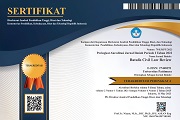The Strategic Role of the Commercial Court in Resolving Digital Company Bankruptcy Disputes
 ), Hardi Fardiansyah(2), Danil Danil(3), Lilis Suryani(4), Tora Yuliana(5), Kevin M Riverra(6)
), Hardi Fardiansyah(2), Danil Danil(3), Lilis Suryani(4), Tora Yuliana(5), Kevin M Riverra(6)
(1) Faculty of Law, Universitas Nasional, Jakarta, Indonesia
(2) Faculty of Law, Universitas Sehati, Karawang, Indonesia
(3) Faculty of Law, Universitas Sawerigading, Makassar, Indonesia
(4) Institut Ilmu Sosial Dan Bisnis Andi Sapada, Parepare, Indonesia
(5) Institut Maritim Prasetiya Mandiri, Bandar Lampung, Indonesia
(6) College of the Immaculate Conception and University of the Cordilleras, Baguio, Philippines
 Corresponding Author
Corresponding Author
Abstract
Introduction: The digital economy has transformed legal structures, especially in insolvency law, where digital companies often treat personal data as a core asset. However, Law Number 37 of 2004 on Bankruptcy and Suspension of Debt Payment Obligations lacks specific provisions regarding personal data, while Law Number 27 of 2022 on Personal Data Protection does not address how data should be treated in bankruptcy. This regulatory gap risks the exploitation of personal data by creditors or curators, potentially violating constitutional rights.
Purposes of the Research: This study aims to examine the legal consequences of the absence of clear regulations on personal data in bankruptcy cases and propose legal solutions to protect data subjects’ rights within digital insolvency proceedings.
Methods of the Research: The research employs a normative juridical approach, combining statutory and conceptual analyses. It examines relevant Indonesian laws and draws comparisons with the European Union’s General Data Protection Regulation (GDPR) to understand international best practices. Legal materials are analyzed qualitatively.
Results Main Findings of the Research: The study proposes recognizing personal data as a sui generis legal object in bankruptcy proceedings, requiring distinct legal treatment and safeguards. It highlights the role of the Commercial Court in protecting data subjects’ rights and suggests amending the UUK-PKPU, issuing Supreme Court guidelines, and promoting interagency coordination. This research contributes a normative model to integrate personal data protection within Indonesia’s digital insolvency framework, ensuring constitutional rights remain upheld in the digital era.Keywords
DOI
10.47268/ballrev.v6i2.3056
Published
2025-07-31
How To Cite
@article{BALLREV3056,
author = {Nanda Rizkia and Hardi Fardiansyah and Danil Danil and Lilis Suryani and Tora Yuliana and Kevin Riverra},
title = {The Strategic Role of the Commercial Court in Resolving Digital Company Bankruptcy Disputes},
journal = {Batulis Civil Law Review},
volume = {6},
number = {2},
year = {2025},
keywords = {Digital Bankruptcy; Personal Data; Norm Vacuum.},
abstract = {Introduction: The digital economy has transformed legal structures, especially in insolvency law, where digital companies often treat personal data as a core asset. However, Law Number 37 of 2004 on Bankruptcy and Suspension of Debt Payment Obligations lacks specific provisions regarding personal data, while Law Number 27 of 2022 on Personal Data Protection does not address how data should be treated in bankruptcy. This regulatory gap risks the exploitation of personal data by creditors or curators, potentially violating constitutional rights.Purposes of the Research: This study aims to examine the legal consequences of the absence of clear regulations on personal data in bankruptcy cases and propose legal solutions to protect data subjects’ rights within digital insolvency proceedings.Methods of the Research: The research employs a normative juridical approach, combining statutory and conceptual analyses. It examines relevant Indonesian laws and draws comparisons with the European Union’s General Data Protection Regulation (GDPR) to understand international best practices. Legal materials are analyzed qualitatively.Results Main Findings of the Research: The study proposes recognizing personal data as a sui generis legal object in bankruptcy proceedings, requiring distinct legal treatment and safeguards. It highlights the role of the Commercial Court in protecting data subjects’ rights and suggests amending the UUK-PKPU, issuing Supreme Court guidelines, and promoting interagency coordination. This research contributes a normative model to integrate personal data protection within Indonesia’s digital insolvency framework, ensuring constitutional rights remain upheld in the digital era.},
issn = {2746-8151}, pages = {116--125} doi = {10.47268/ballrev.v6i2.3056},
url = {https://fhukum.unpatti.ac.id/jurnal/ballrev/article/view/3056}
}
Bintarawati, Fenny. “The Influence of The Personal Data Protection Law (UU PDP) On Law Enforcement In The Digital Era.” ANAYASA: Journal of Legal Studies 1, no. 2 (22 Januari 2024): 135–43. https://doi.org/10.61397/ays.v1i2.92.
Budhisatrio, J. B., Dhaniswara K. Harjono, dan Binoto Nadapdap. “Permohonan Pailit Oleh Konsultan Kepada PT. Prudential Life Assurance.” Jurnal Syntax Admiration 2, no. 11 (23 November 2021): 2105–22. https://doi.org/10.46799/jsa.v2i11.337.
Christiani, Karina, Arief Wibisono, dan Gatut Hendro Tw. “Perlindungan Hukum Terhadap Nasabah Cryptocurrency Di Indonesia.” SALAM: Jurnal Sosial Dan Budaya Syar-i 9, no. 5 (14 Agustus 2022): 1541–56. https://doi.org/10.15408/sjsbs.v9i5.27644.
Neueder, Andreas, Anaelle A. Dumas, Agnesska C. Benjamin, dan Gillian P. Bates. “Regulatory Mechanisms of Incomplete Huntingtin mRNA Splicing.” Nature Communications 9, no. 1 (27 September 2018): 3955. https://doi.org/10.1038/s41467-018-06281-3.
Pakpahan, Jonathan Matthew. “Kesadaran Urgensi Peran Pengendali Dan Prosesor Data Pribadi Dalam Rangka Pelindungan Data Pribadi Individu Berdasarkan Undang-Undang Nomor 27 Tahun 2022 Tentang Pelindungan Data Pribadi.” Jurnal Hukum To-Ra : Hukum Untuk Mengatur Dan Melindungi Masyarakat 10, no. 1 (26 April 2024): 119–37. https://doi.org/10.55809/tora.v10i1.331.
Rahman, Irsan, Mohamad Hidayat Muhtar, Novita M. Mongdong, Rahmat Setiawan, Beni Setiawan, dan Henry Kristian Siburian. “Harmonization of Digital Laws and Adaptation Strategies in Indonesia Focusing on E-Commerce and Digital Transactions.” Innovative: Journal Of Social Science Research 4, no. 1 (18 January 2024): 4314–27. https://doi.org/10.31004/innovative.v4i1.8240.
Suwito, Deni Setiyawan, Mohamad Hidayat Muhtar, dan Ahmad. “Contemplating the Morality of Law Enforcement in Indonesia.” Journal of Law and Sustainable Development 11, no. 10 (25 Oktober 2023): e1261–e1261. https://doi.org/10.55908/sdgs.v11i10.1261.
Tamba, Fransman Ricardo. “Analisis Putusan Pailit Nomor: 02/Pailit/2009/PN.Niaga.Smg Terhadap Undang-Undang Nomor 37 Tahun 2004 Tentang Kepailitan dan Penundaan Kewajiban Pembayaran Utang.” Journal of Private and Commercial Law 1 (2017): 29.
Tiller, E. Allan. “Personal Liability of Trustees and Receivers in Bankruptcy.” American Bankruptcy Law Journal 53 (1979): 75.| Dublin Core | PKP Metadata Items | Metadata for this Document | |
| 1. | Title | Title of document | The Strategic Role of the Commercial Court in Resolving Digital Company Bankruptcy Disputes |
| 2. | Creator | Author's name, affiliation, country | Nanda Dwi Rizkia; Faculty of Law, Universitas Nasional, Jakarta; Indonesia |
| 2. | Creator | Author's name, affiliation, country | Hardi Fardiansyah; Faculty of Law, Universitas Sehati, Karawang; Indonesia |
| 2. | Creator | Author's name, affiliation, country | Danil Danil; Faculty of Law, Universitas Sawerigading, Makassar; Indonesia |
| 2. | Creator | Author's name, affiliation, country | Lilis Suryani; Institut Ilmu Sosial Dan Bisnis Andi Sapada, Parepare; Indonesia |
| 2. | Creator | Author's name, affiliation, country | Tora Yuliana; Institut Maritim Prasetiya Mandiri, Bandar Lampung; Indonesia |
| 2. | Creator | Author's name, affiliation, country | Kevin M Riverra; College of the Immaculate Conception and University of the Cordilleras, Baguio; Philippines |
| 3. | Subject | Discipline(s) | |
| 3. | Subject | Keyword(s) | Digital Bankruptcy; Personal Data; Norm Vacuum. |
| 4. | Description | Abstract | Introduction: The digital economy has transformed legal structures, especially in insolvency law, where digital companies often treat personal data as a core asset. However, Law Number 37 of 2004 on Bankruptcy and Suspension of Debt Payment Obligations lacks specific provisions regarding personal data, while Law Number 27 of 2022 on Personal Data Protection does not address how data should be treated in bankruptcy. This regulatory gap risks the exploitation of personal data by creditors or curators, potentially violating constitutional rights.Purposes of the Research: This study aims to examine the legal consequences of the absence of clear regulations on personal data in bankruptcy cases and propose legal solutions to protect data subjects’ rights within digital insolvency proceedings.Methods of the Research: The research employs a normative juridical approach, combining statutory and conceptual analyses. It examines relevant Indonesian laws and draws comparisons with the European Union’s General Data Protection Regulation (GDPR) to understand international best practices. Legal materials are analyzed qualitatively.Results Main Findings of the Research: The study proposes recognizing personal data as a sui generis legal object in bankruptcy proceedings, requiring distinct legal treatment and safeguards. It highlights the role of the Commercial Court in protecting data subjects’ rights and suggests amending the UUK-PKPU, issuing Supreme Court guidelines, and promoting interagency coordination. This research contributes a normative model to integrate personal data protection within Indonesia’s digital insolvency framework, ensuring constitutional rights remain upheld in the digital era. |
| 5. | Publisher | Organizing agency, location | Faculty of Law, Universitas Pattimura |
| 6. | Contributor | Sponsor(s) | |
| 7. | Date | (YYYY-MM-DD) | 2025-07-31 |
| 8. | Type | Status & genre | Peer-reviewed Article |
| 8. | Type | Type | |
| 9. | Format | File format | |
| 10. | Identifier | Uniform Resource Identifier | https://fhukum.unpatti.ac.id/jurnal/ballrev/article/view/3056 |
| 10. | Identifier | Digital Object Identifier | 10.47268/ballrev.v6i2.3056 |
| 11. | Source | Title; vol., no. (year) | Batulis Civil Law Review; Vol 6, No 2 (2025): VOLUME 6 ISSUE 2, JULY 2025 |
| 12. | Language | English=en | en |
| 13. | Relation | Supp. Files | |
| 14. | Coverage | Geo-spatial location, chronological period, research sample (gender, age, etc.) | |
| 15. | Rights | Copyright and permissions | Copyright: Authors who publish their manuscripts in this Journal agree to the following conditions: 1. The copyright in each article belongs to the author, as well as the right to patent. 2. Authors are able to enter into separate, additional contractual arrangements for the non-exclusive distribution of the journal's published version of the work (e.g., post it to an institutional repository or publish it in a book), with an acknowledgment of its initial publication in this journal. 3. Authors are permitted and encouraged to post their work online (e.g., in institutional repositories or on their website) prior to and during the submission process, as it can lead to productive exchanges, as well as earlier and greater citation of published work. 4. Authors have the right to self-archiving of the article (Author Self-Archiving Policy)
Licence : Batulis Civil Law Review Journal is disseminated based on the Creative Commons Attribution-NonCommercial 4.0 International license terms. This license allows anyone to copy and redistribute this material in any form or format, compose, modify, and make derivatives of this material for any purpose. You cannot use this material for commercial purposes. You must specify an appropriate name, include a link to the license, and certify that any changes have been made. You can do this in a way that is appropriate, but does not imply that the licensor supports you or your use.
|
Copyright (c) 2025 Nanda Dwi Rizkia, Hardi Fardiansyah, Danil Danil, Lilis Suryani, Tora Yuliana, Kevin M Riverra

This work is licensed under a Creative Commons Attribution-NonCommercial 4.0 International License.

 : 831 times
: 831 times Download : 421 times
Download : 421 times














